
Facts and Figures
Legal Form
The Max Planck Society is a non-profit organization under private law in the form of a registered association. Its highest-ranking decision-making body is the Senate. Its members come from major sectors of academic and public life.
The Max Planck Society's Administrative Headquarters with the President's Office are located in Munich.
Institutes
There are 84 institutes and research facilities (as of January 1, 2024); four institutes and one research facility are situated abroad.
Personnel
The Max Planck Society employed a total of 23,950 staff as of 31 December 2021, comprising 20,898 contractually employed individuals, 519 scholarship holders as well as 2,533 guest scientists. Of the contractually employed individuals, 6,745 individuals were employed as Directors, Research Group Leaders or Scientific Research Assistants, another 3,473 as doctoral candidates. Non-scientific activities include 8,625 persons in technology and administration. 397 employees completed an apprenticeship on the reporting date; a further 1,500 persons were employed as student and scientific assistants.
As of December 31, 2021, the proportion of female employees was 44.7 percent. The proportion of women researchers was 18.4 percent at W3 level, 36.0 percent at W2 level and 32.8 percent at the level of scientists employed under the collective agreement for the public sector; in the non-scientific areas it was 54,9 percent.
Among the scientists, the proportion of those from abroad was 54.9 percent – this high proportion can be attributed to the fact the International Max Planck Research Schools particularly recruit international Ph.D. students and that a high number of visiting scientists come from abroad.
Finances
The Max Planck Society is mainly financed by public funds from the federal government and the federal states*, in the year 2021 the MPG is financed to approximately 1,97 billion euros.
In addition, the Max Planck Society and its Institutes receive third party project funding from public and private contributions and from the European Union. The federal and state governments jointly provide the subsidies for the budget of the Max Planck Society.
* The Free State of Saxony requests the following information: "This funding is co-financed by tax revenues on the basis of the budget approved by the Saxon State Parliament".